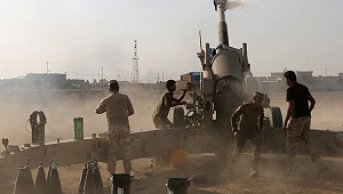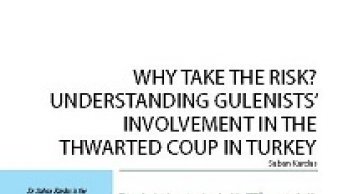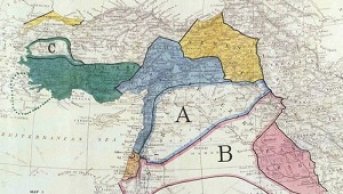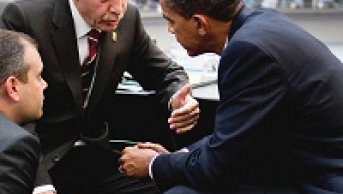AK Party, West and Liberals: Time for rethinking

Turkey’s Justice and Development Party’s (AK Party) relationship to the West and the Western debate on Turkey under the AK Party has hardly had a linear path. Founding cadres of the party were first asked to prove their commitment to the West when they rose to power in 2002, due largely to their ideological background. The commitment they would have attached to the EU accession and the ties with the United States were the core components of this test. Drawing on its reformist identity, the AK Party performed well on this test during its first time in government, and consequently, its relationship with the West progressed on a satisfactory path. The parties managed to bridge the differences caused by the US invasion of Iraq in 2003 and criticisms questioning Turkey’s ‘Western identity’ remained limited. This was the period when the AK Party was given credit owing to its ‘conservative democrat’ identity which arguably enabled the party to embrace the democratic norms, and this example was believed to set a role model for other countries in the region.
On its second term in office, the criticism of the AK Party in the West intensified, which at times led to tensions in Turkey’s relations with its partners. On one hand, the EU accession process, which was launched in great joy, gradually hit a deadlock following the French and Greek Cypriot vetoes. On the other hand, the independent posture Turkey adopted in its regional policies triggered another debate around the themes of ‘Middle Easternization’ or ‘shift of axis.’ In this unfolding debate, the ‘Islamist’ identity of the AK Party leadership has increasingly featured in Western criticisms.
The rise of ‘Islamism-cum-authoritarianism’ criticism
On the third term of the AK Part governments, the criticisms have over time taken an individualistic character and is identified with the then Prime Minister Recep Tayyip Erdogan’s leadership and political style. In addition to the regional political developments and the oscillations in relations with the West, domestic political process also have become a matter of contention. The criticisms centered around the Kurdish question were largely forestalled owing to the ‘Kurdish opening’ and ‘resolution process’ while other macro-level democratization efforts such as civil-military relations and regulations concerning party closures, also bolstered the government’s democratic credentials. Increasingly, the criticisms were directed against individual rights, freedom of expression and recently the independence of the judiciary. In this process, the Western debate on Turkey has been constructed around the Prime Minister Erdogan’s ‘authoritarian’ identity in addition to the ‘Islamism criticism’. This blend of authoritarianism and Islamism has been identified as the root cause of not only all the contentious issues in Turkish domestic politics but also the foreign policy problems of the country.
While the Western discourse on the AK Party and Turkey based on such criticism as ‘drifting from the West,’ ‘Islamization,’ or ‘authoritarianism’ remained at times as intellectual exercises, from time to time they have been given credit by policy-makers. Nonetheless, it would be hard to say that this discourse completely shaped Western policy on Turkey. For instance, since 2009 when ‘Islamism-cum-authoritarianism’ criticism has started to take shape, there have been several suggestions or warnings to the President Obama who labelled Turkey as ‘model partner’ that he should think twice before adopting a positive outlook on Turkey, make its support conditional on Erdogan’s adherence to stricter democratic conditions, review the relations with Turkey or instigate domestic transformation. Some even raised the possibility of ‘punitive’ steps, particularly over Turkey’s Israel and Iran policies. Similarly, there have been calls for substantial revision of Turkey’s stalled EU membership process including the possibility of freezing the accession talks.
Primacy of geopolitics and the post-Gezi environment
Despite such criticisms, strategic calculations have affected the thinking in both the United States and European countries, and in the final analysis, the tendency to work with Erdogan’s Turkey has prevailed. Especially, the turmoil and instability caused by the political transition has rendered Turkey the reliable ‘partner’ for the West which made it easy to disregard some political criticisms toward Ankara. While expectations were high that Turkey could become the role model for regional transformation during the first phase of the Arab Spring, in the recent phase Turkey’s potential contributions to the regional stability have come to the forefront. In this environment, irrespective of its ‘democratic deficit,’ the AK Party which established itself as the dominant party, came to be recognized as the inevitable actor to work with.
Following the Gezi events, a new period started where a visible turn in the Western views of the AK Party has taken shape, and Islamism-cum-authoritarianism debate has found a more welcoming audience among the policy makers. Consequently, it has been possible to hear criticisms over individual liberties, press freedoms or rule of law coming from Western officials more often while the brake mechanisms provided by the geopolitical reasoning has been less effective. The cooling off of the Turkish - American relationship following President Obama’s warm welcome to Prime Minister Erdoğan during his Washington visit on May 2013 was reflective of this new climate. Similarly, despite France’s decision to remove its veto following election of President Hollande and unblock the EU accession process, the delays in the realization of this decision were a product of the post-Gezi environment.
Post-Gezi: questioning the AK Party’s capacity to govern and rise of ‘wait-and-see’ approach
In the post-Gezi era, a more fundamental line of criticism entered into denigration in addition to the authoritarianism debate which questioned the AK Party’s capacity to govern the country. Moving from the assumptions that the country was polarized due to Erdogan’s divisive policies, that the structural problems of the economy were deepening or that the regional instability will engulf Turkey, the political legitimacy of the AK Party has been questioned. The perception that post-Gezi social movements posed a substantial challenge to the AK Party’s dominant position in Turkish politics gained wide acceptance. Those critics also referred to the delays in the new constitution or further reforms such as in the Kurdish question to substantiate their arguments while the new democratization package announced in Fall 2013 was found lacking.
In this new era, a major issue of contention was the questioning of Prime Minister Erdogan and AK Party’s ability to govern the upcoming political processes. There was a widespread perception in the Western debate that the electoral cycle -- 2014 local and presidential elections and 2015 parliamentary elections -- and the leadership transition in the AK Party and state administration taken together with the post-Gezi ‘societal opposition’, would undermine political stability and deepen the economy’s fragility, hence make governance a daunting task. This perception was shared not only by the media and think-tank world, but also international financial circles and policy makers came to embrace it, almost turning into wishful thinking by those desperately seeking to see the AK Party has left power.
December 17 operations and the subsequent developments were another turning point. The assumption that the AK Party would have received a fatal blow from these allegations and would have had a hard time managing the upcoming elections and the political transition was shared by most analyses in the West. In this new environment, a new indeterminate period started where a ‘wait-and-see’ approach prevailed over decisions ranging from investments to political cooperation. In this period, the final residues of the AK Party-liberal alliance too disappeared as many liberals also apparently bet on the AK Party’s demise due partly to their close ties with the Gulen movement.
AK Party, Liberals and the West
A critical variable in these changes was the position of the liberals and the gradual disappearance of the AK Party-liberal alliance. Traditionally, the so-called liberal intelligentsia had been instrumental in the AK Party’s positive reception in the West. The main function of the liberal intellectuals has been to provide communication channels with the West through which the construction and promotion of the ‘conservative democratic’ identity of the Party in the West were facilitated. The democratic reforms or the progress toward EU membership were the basis of that alliance. To the extent that they were underlining the democratic credentials of the Party, they also countered the criticisms or suspicions in the West which sought to label it as Islamist during the first term. In the second term of the AK Party, liberals still played a major role in sustaining the Party’s image in the West, especially in the context of the Kemalist establishment’s struggle to outlaw the Party.
During the third term, the AK Party-liberals coalition gradually disintegrated with different liberals severing the ties with the party in separate stages or turning points, most importantly after the Gezi events. In the process, the liberals also have been divided among themselves as some still continue to support the AK Party. For most liberals, their break with AK Party was obvious as they chose to highlight what they deemed the AK Party’s failures regarding widening the scope of individual rights. Others, on the other hand, focused on the macro-level Processes and continued to argue that the Party still held reformist credentials. In many cases, personal reasons also played a key role in this reshuffling of positions and alliances. Granted, many of the liberals reversed positions and played a critical role in the construction and dissemination of the new image of AK Party and Erdoğan formed around authoritarianism-cum-Islamism. Considering their traditional networks with the Western intelligentsia, their mutual interactions were decisive in the new discourse on Turkey.
AK Party’s position in this ‘split’ was a product of different factors. First, as part of the consolidation of its own identity and place in Turkish politics, the Party gradually differentiated itself from the liberals who at times appeared claiming leverage –if not tutelage- over the Party’s legitimacy and credibility. With the new balance of power in domestic politics, the Party was less interested in granting leverage to a group whose electoral constituency was not decisive. Second, the AK Party’s ability to establish its own communication mechanisms with the Western world also undermined the pragmatic basis of the alliance. Third, given the prevalence of strategic calculations in the Western thinking of Turkey, the Party came to learn that such criticisms could also be countered by other political channels. Meanwhile, the fluctuations in the Western position on democratization in the region as was seen in the weak reactions to the coup in Egypt, undermined the moral superiority of the West in Turkish perceptions, hence the value of outside criticism.
Last but not least, the AK Party objected to the essence of the liberal criticism. AK Party continued to view itself as a reformist force though it may not be pursuing the same roadmap as the liberals would have wanted it. This was a more fundamental difference pertaining to the content and timing of further democratization as the AK Party sustained the reformist path on a macro level while the issue of individual rights remained contentious. To the extent that the AK Party has seen a fundamental challenge to its political survival and the integrity of the state, it focused its efforts on countering those threats than narrowly focusing on the liberals’ political agenda.
2014 electoral cycle completed: revisiting the ‘wait-and-see’ approach
Though the AK Party’s performance in the 2014 municipal and presidential elections have been hardly digested by many Western experts, the political elites will likely abandon the ‘wait-and-see’ approach. Particularly, the AK Party’s ability to manage the leadership transition and the formation of the new cabinet in a swift and smooth manner has made it clear that there was a serious miscalculation on the part of the liberal and Western commentators as regards the AK Party’s inner integrity and the breadth of Erdogan’s leadership, which produced some faulty analyses in the last few months.
Considering the ongoing conflict and instability in Turkey’s vicinity, the pressure on the West to work with Turkey will hardly go away. The AK Party still holds the dominant position and remains the formidable force to produce policies to address the structural problems of Turkish politics, most notably the Kurdish issue or rewriting of the constitution. Despite political uncertainty might increase in the run up to the 2015 elections, the Party is likely to maintain its electoral hegemony. The Western institutions and decision makers will most probably get used to the new political reality in Ankara, shaped around a dominant AK Party, a popularly-elected president willing to play a more decisive role in close harmony with the government led-by Ahmet Davutoglu. This, however, will hardly end the gap between the reality of Turkish politics and Western discourse on it.
* This article was published on September 08, 2014 by Turkey Agenda












